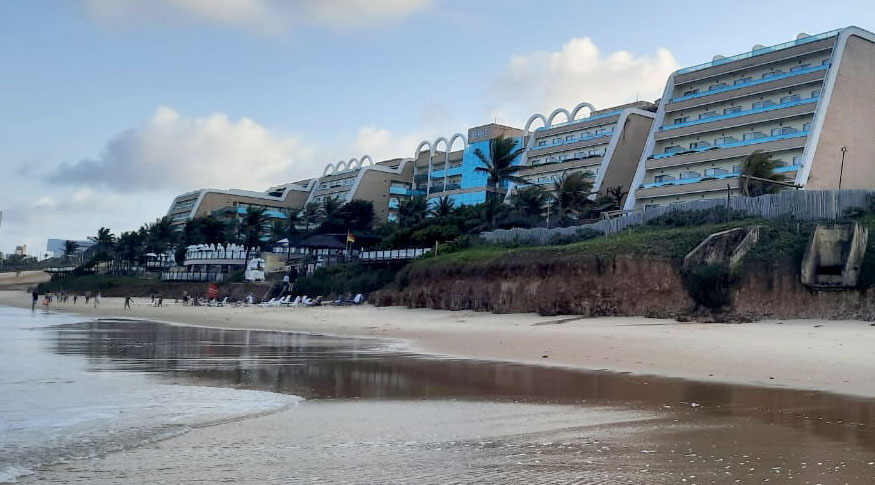Monthly Survey of Services
Services increase by 1.1% in July and hit five-year peak
September 14, 2021 09h00 AM | Last Updated: September 15, 2021 02h38 AM

Volume of services increased by 1.1% from June to July, fourth positive rate in a row, with a cumulative 5.8% in the period. As a result, the sector is 3.9% above the pre-pandemic level of February 2020, and also hit its peak from March 2016. Despite such an increaase, the sector is still 7.7% below the series record, hit in November 2014. These are data from the Monthly Survey of Services - PMS, released today (14) by the IBGE.
Against July 2020, volume of services advanced 17.8%, fifth positive rate in a row. In the cumulative index in the year, the sector grew 10.7% over the same period a year ago. In 12 months, having changed from 0.4% in June to 2.9% in July, the sector kept the upward trend initiated in February this year (-8.6%).
Only two of the five activities surveyed pushed the July result, mainly services rendered to families (3.8%), with a cumulative increase of 38.4% between April and July. Professional, administrative and complementary services advanced 0.6%, with an increase of 4.3% in the last three months and, for the first time, surpassed the pre-pandemic level, being 0.5% above that of February 2020.
“These two activities are, in fact, those recording main losses in the most severe moments of the pandemic. These are onsite services activities, which have, gradually, with the flexibilization of protocols and the advance of vaccination, tried to recover from losses recorded between march and May last year,” says the survey analyst, Rodrigo Lobo.
In services rendered to families, a highlight is the segment of hotels, restaurants, catering services and themaric parks, which usually record increases in July because of the vacation period. As for professional, administrative and complementary services, a highlight is legal activities, engineering services and solutions in electronic payment.
Services rendered to families are still below pre-pandemic level
Despite the increase in July, services rendered to families are 23.2% below the level of February 2020. This is the only one of the five activities that has not yet exceeded the pre-pandemic figure.
“We can understand that because this activity concentrates most services rendered onsite. It has faced limited supply. Some establishments are closed and other have reopened, but they are not working at full capacity. From the perspective of demand, there is some pressure due to the lack of advance of families’ wage bill and the level of unemployment, which prevent this service from increasing the same way as other ones surveyed in the same sector,” Mr. Lobo adds. .
Other activities recorded negative changes below one percentage point
With negative impacts on the general index, information and communication services (-0.4%), transportation, support services to transportation and mailing (-0.2%) and other services (-0.5%) recorded changes below one percentage point.
“Information and communication services recorded the main negative result. The segments of telecommunications and technology services recorded positive rates, but there was signifcant pressure exerted by audiovisual, editing and news agency services, which fell by 11.6% from June to July,” says the PMS analyst.
In July, 15 out of 27 Federation Units grew in volume of services against the previous month. Among the places with positive rates, the most important impacts came São Paulo (1.4%), Rio Grande do Sul (3.4%), Minas Gerais (1.2%), Pernambuco (4.1%) and Paraná (1.5%). The state of Rio de janeiro (-4.4%) accounted for the main decrease in the period.
Remote services have supported sector increase
Although onsite services rendering increased in July, Rodrigo Lobo observes that remote activities have been responsible for recovery of the services sector since the most severe phase of the pandemic, between March and May last year. From June last year to July this year, the sector has recorded 13 positive rates, except for the rate in March last year, which had a negative change due to the interruption of non-essential activities as a result of the second wave of the new coronavirus.
“With the advance of vaccination and more flexibility of economic activities, onsite services remain increasing, but still at a lower rate in comparison with figures of February 2020. What keeps the services sector at a level a little below that of March 2016 are remote services, such as information technology services, financial services, and storage, support services for transportation and mailing, which recorded major increases,” Mr Lobo explains.
Among financial services are security brokers and stock market. Storage includes management of ports and terminals. And support services for transportation encompass sailing and marine support, such as oil rig tugboats and shipping agency, which include loading and unloading of ship containers.
Index of tourism activities grows, though not enought to reach pre-pandemic level
PMS shows that the tourism activity index increased 0.5% in July against June. It is the second consecutive positive rate, a period in which it recorded a growth of 42.2%. The segment of tourism should grow 32.7% to get back to the level of February last year.
Eight of the 12 Federation Units surveyed in this indicatos recorded positive rates, among which stand out: Pernambuco (9.5%), Santa Catarina (9.4%), Bahia (6.1%) and Rio de Janeiro (2.1%). With negative figures: São Paulo (-0.4%), Paraná (-1.6%), Goiás (-1.9%) and Federal District (-0.3%).
More about the survey
The Monthly Survey of Services (PMS)produces indicators to monitor short-term performance of the services sector in Brazil. The survey investigates the gross revenue from services in formal enterprises, employing 20 or more persons, in which the main activity is a non-financial service, excluding the areas of health and education. It produces results for Brazil and all the Federation Units. Results are available at Sidra.




















